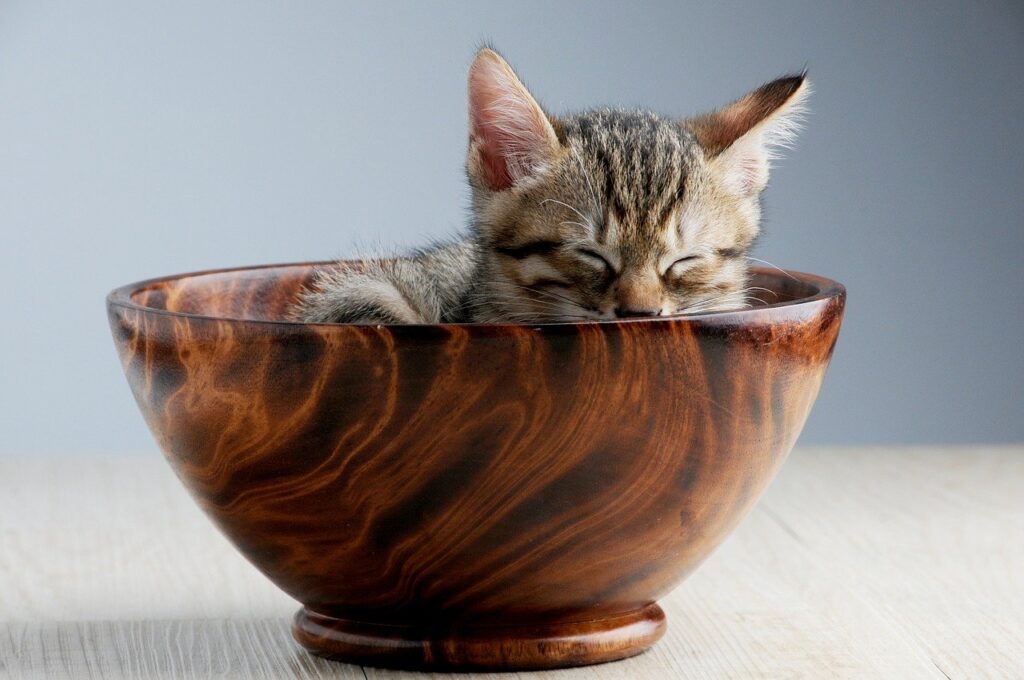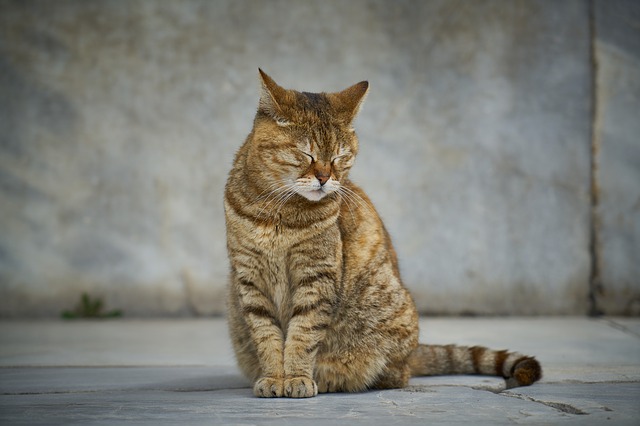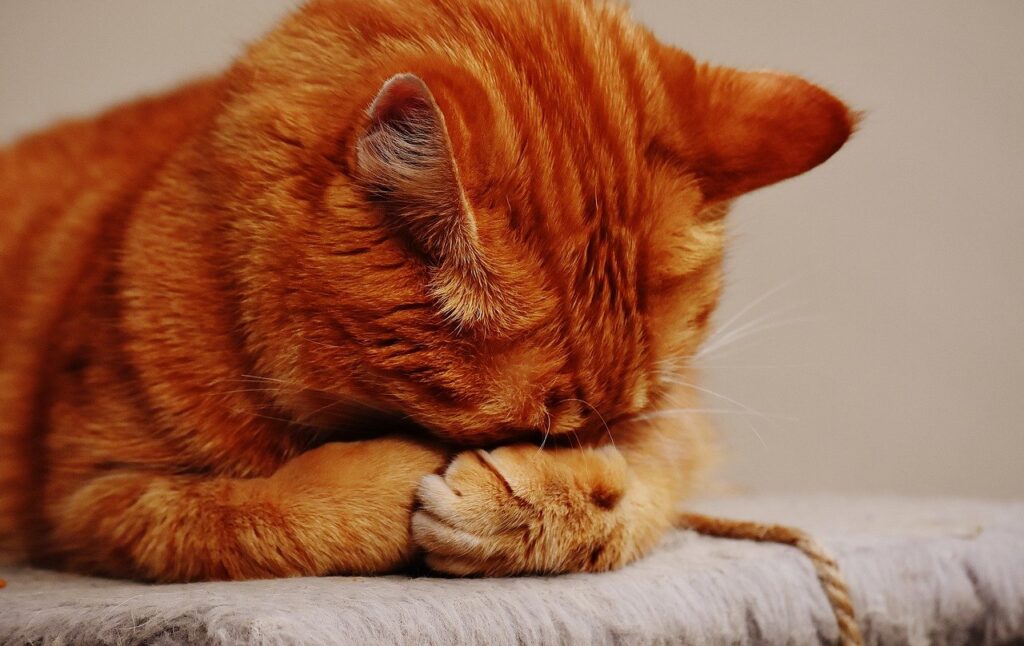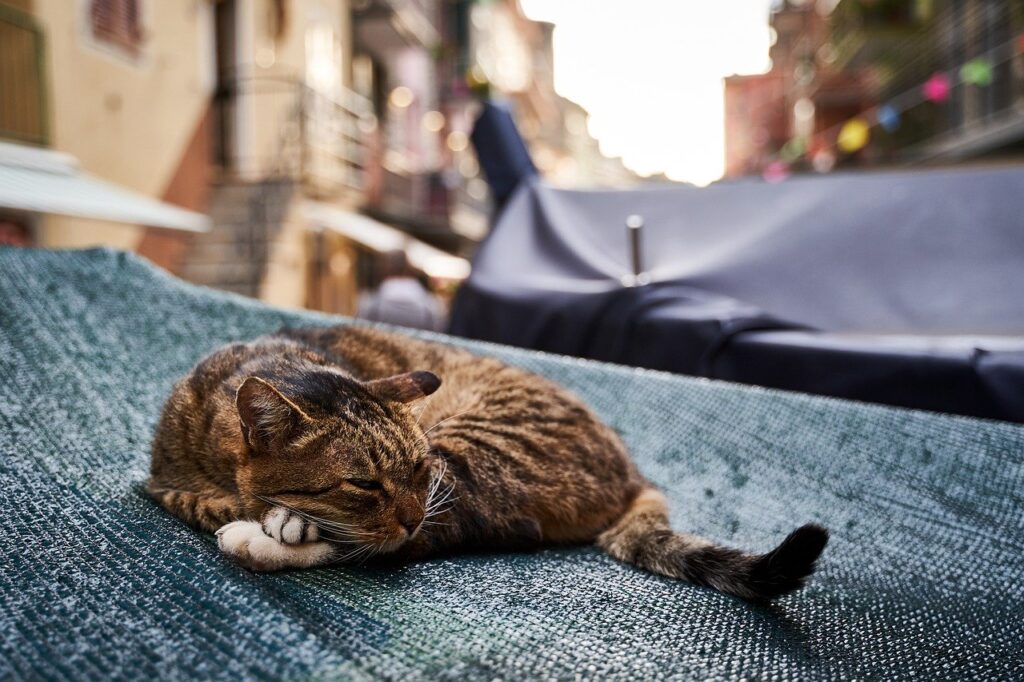We all know that having adequate sleep is a top priority in the cat world. That’s why we have several pictures of our cats sleeping in different positions and different areas of the house on our phones.
The question is, why does a cat sleep so much? Cats enjoy having a good sleep because it’s in their genes – but there’s more to it. Depending on their age, cats can sleep between 15 to 20 hours per day.
Read on to find out the possible reasons why cats sleep so much, what to do when they keep on waking you up at night?
Why Do Cats Sleep So Much?
One of the main reasons why cats sleep so much is because they conserve their energy. Like other unusual behavior that they exhibit, such as kneading, fitting themselves into tight spaces, and hanging out in higher areas of the house, sleeping for most periods is also part of their natural instincts.

Despite long hours of sleep, cats are not lazy animals. Because they can be either prey or predator, cats need to rest to recharge themselves. Resting is their way to prepare for the “big hunt”. While domesticated cats do not hunt their dinner, they still retain their natural hunting instinct. Like their big cat counterparts, cats follow the hunt, feast, and sleep schedule.
Cats are crepuscular, which means that they are more active in twilight – the period between dusk and dawn. For this reason, you may notice that your cat will spend most of their daytime sleeping, while during the early morning, they will run and play around the house.
Aside from deep sleep, cats may also doze off for a short time that lasts from five to thirty minutes. During these times, they remain vigilant for preys or predators.
Other Possible Reasons Why Cat Sleeps So Much
Aside from being part of their natural instincts, there are other reasons why your cat may sleep so much. Here are a few:
Your cat may not be actually sleeping
As mentioned earlier, cats may doze off briefly, which is called a “cat nap”. You may see them closing their eyes, but their tails and ears may still be moving if you look closely. This is because they still listen to their environment and are ready to jump into action if they sense a prey or a predator.

Your cat is bored
Just like humans, cats tend to sleep more when they are bored. In the long run, this boredom may cause them to develop destructive behaviors, so it is important to keep them busy when they are awake.
Fortunately, there are several ways to keep your cat entertained. One way is to build your own catio – an enclosed outdoor space for your cat. If you don’t have the space and time to build one, you can buy a cat tower or climbing shelves where they can rest or play. You can also provide your cat with various toys that they can play with. Just remember not to make all of their toys available all the time as they may get bored with them easily. Instead, alternate the toys that you provide them with.
Your cat is stressed
Sleeping is a common coping tool for a stressed cat. Cats usually hide when there is a loud noise in the environment or tend to be less active when scared.
If you think that your cat sleeps more because they are stressed, it’s high time to ask for your veterinarian’s help. He may refer you to a legitimate veterinary behaviorist that can help your cat feel better.
Your cat is sick
Aside from being stressed, cats also sleep more when not feeling well. Usually, they may spend most of their time hiding in one place, such as under the bed or at the highest part of the home, to hide their pain.
Again, if you think that something is wrong with your cat, seek your veterinarian’s help immediately.
It is part of your cat’s sleeping pattern
Some cats have adapted their family’s sleeping patterns – they are active during the daytime and sleep with their owners at night. However, many cats are active at night, which is part of their natural instincts.

For newborn kittens, sleep time is usually up to 24 hours a day. Their average sleep time decreases to 16 hours a day as they mature. Once they reach their senior years, this changes once again. What they only do is nurse and grow.
Your cat may be cooling down
Cats, especially those who live in warm climates, tend to sleep more because sleeping helps regulate their body temperature. Sleeping is their way to keep themselves cool and conserve energy.
Your cat likes to stay in bed
Who does not like to stay in bed, anyway? Even we humans know how comfortable it is to just lay in your bed all day. Like humans, cats also enjoy the comfort of sleeping in bed or boxes.
Your cat may be recharging his energy
Cats need to recharge their “batteries” to prepare for hunting later at dawn or dusk. For them, every second of slumber counts!
Your cat’s behavior is affected by the weather
Just like humans, the weather also affects cats. Depending on the weather, your cat’s sleeping pattern may vary. Even if your cat does not go out, the feeling of a cold, rainy day is enough to keep him yawning and sleeping most of the time.

How much sleep do cats need every day?
Reports on how much cats sleep per day vary, but one thing is for sure – they sleep longer than humans. Experts say that cats sleep for about 12 to 15 hours per day. Some even sleep for as much as 20 hours!
Below are cats’ sleeping patterns depending on their age:
- Kittens sleep most of the day. However, they may release some of their energy between meals.
- Adolescent cats have unpredictable sleep patterns. They also have few periods of intensive playfulness.
- Adult cats have more consistent sleeping patterns. On average, they sleep for 12 to 20 hours per day. They also tend to adapt to their family’s sleeping patterns during this time. For example, they may wake up a few minutes before you, spend a few hours socializing with you, and sleep as you go on with your day.
- Meanwhile, seniors have less energy than younger cats, which means they will sleep longer.
Is it normal for cats to snore?
Like humans and canines, cats snore. While it may get irritating at times, when you hear your cat snoring, it means that he is very relaxed. However, if you notice any unusual behavior outside of your cat’s normal, it is best to consult your veterinarian immediately.
How do I stop my cat from waking me up at night?
As mentioned, cats are crepuscular animals. So, you might not be the only one who gets woken up from your cat’s hyperactivity late in the evening or early in the morning.
Below are some of the things you can do to help stop your cat from waking you up at night:
Play with your cat
Spending time with your cat should already be a given. Like all other pets, Cats also need to spend time with their humans, so they do not get sad and bored. If you think you can’t give your pet enough time, then it is best not to adopt one in the first place.
There are various cat toys and items that you can buy or build on your own to ensure that your cat gets the entertainment he needs. Provide him with balls, squishy toys, cat tower, or puzzle toys to ensure that he gets varied toys that will keep his mind and body stimulated.
Playing with your cat in day time will allow them to get tired. You are sure that they will go into a deep slumber to recharge at night, thus limiting the chances of them waking you up in the middle of the night.
Train your cat
Training your cat will be a good idea to take playtime to the next level. You can start with 5 to 15-minute training sessions per day. Just make sure to use positive reinforcement techniques when training your cat, such as using food rewards, praises, and plenty of playtimes.
Close your bedroom door
If your cat gets used to sleeping in your bed every night, adjusting can be a struggle at first. In time, they will get used to it. If you close your bedroom door at night and your cat keeps scratching, you may try leaving them with toys that will keep them occupied while you sleep.
Use an automatic feeder
Using an automatic feeder is a great idea if your cat is waking you up at night or early in the morning because they are hungry. Some also come with food timer bowls so you won’t miss even a minute of feeding time.
Never punish your cat
Cats tend to develop destructive behavior when they are punished. Therefore, you should never punish your cat if they did something wrong. Instead, reward them if they do something that pleases you because they will most likely do it again.
Create a routine
Cats thrive in routine. They like it when you give a specific time for eating, playing, and sleeping. You can adjust their schedule according to yours to prevent them from waking you up at night.
For example, play with them an hour before bedtime, then give them a small snack before sleeping to avoid getting hungry by midnight. Alternatively, you can also use an automatic feeder so that they won’t need to wake you up if they get hungry. In addition, you also have to make sure that they have access to fresh water and a litter box all the time.
Keep your cat off your bed
If you’re struggling to sleep peacefully at night because your cat is jumping and playing on your bed, you should keep your bedroom off-limits from him. You can start by giving your cat his own comfortable bed somewhere in the house where there is less traffic, such as in a spare room or in the corner of the living room where there is enough privacy.
At first, it may be hard for your cat to adjust. To help him cope better with the adjustment, you may try rubbing a few catnips on his bed to encourage him to use them.
Adopt another cat
A cat will easily get bored if it’s left alone all day. Therefore, adopting another one is a good idea to keep your cat entertained while you’re gone. This is especially true for younger cats with higher energy levels than adults. Because they get to play together, it will lessen their urge to play with you at night.
If you have an adult cat, introducing another cat can be pretty complicated, so it must be done very carefully to prevent them from brawling with each other.
Ultimately, it is normal for cats to sleep longer than humans, so you should not be concerned. However, suppose you already know your cat’s sleeping pattern and notice that it changes significantly, such as your cat sleeping more than usual or vice versa. In that case, it is time to have them checked by their veterinarian as they may be suffering from something, but they can’t communicate it with you very well.
